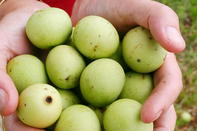The multi-purpose Marula tree (Sclerocarya birrea) has been distributed throughout Africa due to migrations and is native to Southern Africa (South Africa, Botswana, Zimbabwe, Swaziland, Namibia, Angola), West Africa (Niger, Gambia, the Democratic Republic of Congo) as well as Zambia, Sudan, Ethiopia, Kenya, Tanzania (including Zanzibar) and Uganda.

It has been introduced into Mauritius, Reunion and is grown in Israel, Australia and India.
The marula tree is sensitive to frost, is well adapted to poor soils and prefers the warm dry regions of South Africa notably in Mpumalanga and around in Phalaborwa in the Limpopo province. The tree can yield up to 3 tons of plum-sized aromatic fruit. Ripe fruit has a light yellow skin, with white, juicy flesh and a distinctive turpentine flavour. The fruit, nuts, bark, leaves and stem are used.
The marula tree can easily be grown from seed (soaked overnight in warm water), but also by cuttings or grafting. (Grafting is when a shoot op upper part is joined together with a root stock so it can grow together).
Marula fruit starts dropping from the trees in February and March, where after it ripens on the ground (March to April). Fruit are picked from the ground, hand washed, peeled and pulped.
Benefits of Marula Oil
Marula fruit pulp is fermented and used in drinks (juice, liquor and beer) and contains more almost four times the vitamin C of orange juice - 100 g of marula fruit comes with 194 mg of Vitamin C. The skins can be used to make soap, glue or achar. Marula leaves is good for feeding livestock, the bark is used to make a brown dye and the wood makes good carvings.
The nuts (often roasted and eaten) harbour kernels or seeds that contains around 65% oil, a high-value commodity. Brewers throw most of the nuts away or burn them as fuel because cracking nuts to extract the kernels is very time consuming.
Scientists at Everpix developed a multistep process for cracking the marula nuts to extract the elusive marula oil.
Marula oil is rich in essential fatty acids and its fine molecular structure is the key to its effectiveness as a skin hydrator and protector making it ideal for most of all skin types especially ageing and under-nourished skin.
Marula oil is high in vitamin C and E and rich in monounsaturated fatty acids which makes the oil very stable and very resistant to oxidation. The medium rich oil has an excellent ‘slip factor’ making it an ideal massage oil.
Medical Disclaimer
Information is for educational and informational purposes only and may not be construed as medical advice. The information is not intended to replace medical advice or treatment offered by healthcare professionals.
By Marinda Louw
For bulk or Marula Oil export enquiries please use the enquiry link below.